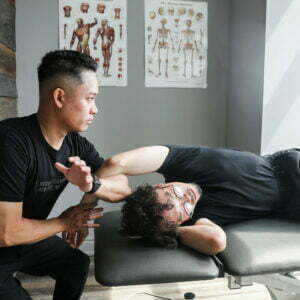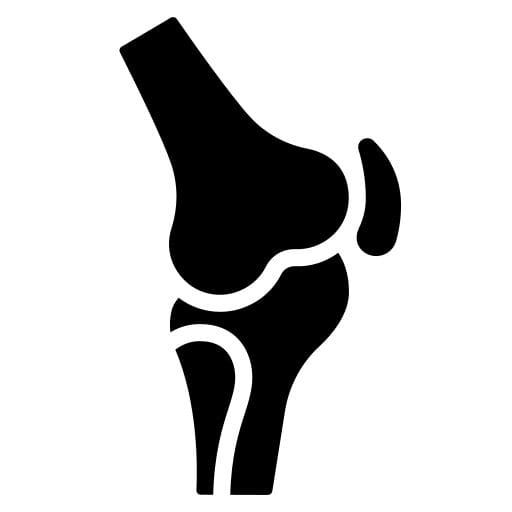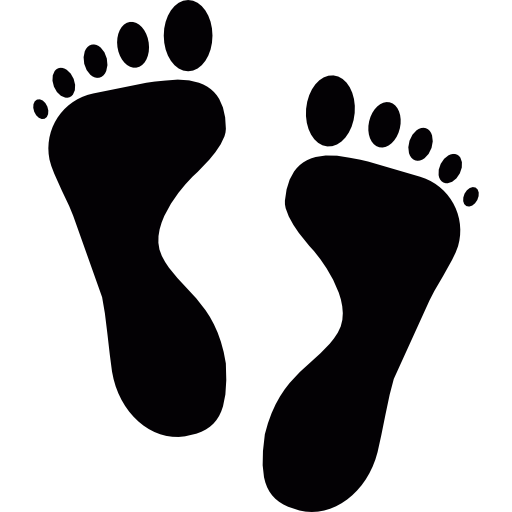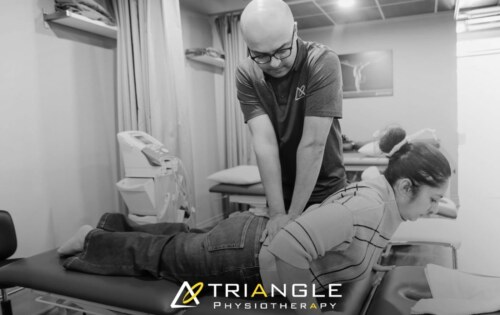Introduction

Triangle Physiotherapy has been providing quality physiotherapy services Greater Toronto Area since 2005. We are pleased to introduce our 7th location in the Waterfront Community on Queens Quay.
We have MOVED! We are located at 17 Lower Jarvis Street, Unit 10 right beside the Tim Hortons and across from Loblaws.
Triangle Physiotherapy Queens Quay is located in the Daniels Waterfront City of the Arts building in close proximity to Sugar Beach, Sherbourne Common, and the Water’s Edge Promenade. Easily accessible via TTC, or walk or cycle to Union Station, Billy Bishop Airport, the Distillery, Financial, or Entertainment Districts, St. Lawrence Market, or the Ferry Terminal. The clinic is in close proximity to other services like walk-in clinics, dentist offices & pharmacies.
WHY CHOOSE TRIANGLE PHYSIOTHERAPY QUEENS QUAY AS YOUR PHYSIOTHERAPY CLINIC IN DOWNTOWN TORONTO?
Our physiotherapists are experts in assessing & treating musculoskeletal conditions like:
- Strains & Sprains
- Everyday aches & pains
- Whiplash due to a car accident
- Back Pain
- Pre & Post Surgical Rehabilitation
- Arthritis
- Rotator cuff injury
- Tension Headaches
- Sciatica
- Tendonitis
- Tennis/golfers elbow
- Bursitis
- Postural Dysfunction
- TMJ disorders
- Carpal tunnel Syndrome
- Athlete’s care
- Pelvic health conditions like incontinence
- Vestibular conditions like vertigo
Physiotherapy Downtown Toronto Service Areas:
How Does Physiotherapy Work?
Physiotherapy is a branch of healthcare that focuses on helping individuals recover from physical injuries, manage chronic conditions, and improve overall physical well-being. It utilizes a combination of manual therapy techniques, exercises, and specialized equipment to address musculoskeletal issues, promote mobility, and alleviate pain.
At Triangle Physiotherapy, we employ a holistic approach to physiotherapy. Our highly skilled and experienced physiotherapists assess each patient’s unique needs and develop personalized treatment plans. These plans may include manual therapy techniques such as joint mobilization and soft tissue massage, therapeutic exercises, electrotherapy modalities, and education on injury prevention and self-management.
How to Find a Good Physiotherapist?
Finding a good physiotherapist who can effectively address your specific needs is crucial for optimal treatment outcomes. Here are some tips to help you in your search:
- Ask for Recommendations: Seek recommendations from friends, family, or healthcare professionals. They can provide valuable insights and firsthand experiences with physiotherapists they have worked with.
- Check Credentials: Ensure that the physiotherapist you choose is a licensed professional. Look for credentials such as Registered Physiotherapist (RPT) or Physiotherapist (PT) after their name. These designations indicate that they have met the necessary educational and professional requirements.
- Experience and Specialization: Consider the physiotherapist’s experience and expertise in treating your specific condition. Some physiotherapists specialize in areas such as sports injuries, orthopedics, neurology, or geriatrics. Choosing a physiotherapist with relevant experience can enhance the effectiveness of your treatment.
- Communication and Rapport: A good physiotherapist should be a good listener and communicator. They should take the time to understand your concerns, explain the treatment plan in clear terms, and provide ongoing support and guidance throughout your recovery journey.
- Convenience and Accessibility: Consider the location and availability of the physiotherapy clinic. Choose a clinic that is easily accessible to you and offers flexible appointment options to accommodate your schedule.
Benefits of Physiotherapy
Physiotherapy offers a wide range of benefits for individuals of all ages and physical conditions. Here are some key advantages of physiotherapy:
- Pain Management: Physiotherapy techniques such as manual therapy, therapeutic exercises, and modalities like ultrasound or electrical stimulation can help reduce pain and improve mobility in individuals with acute or chronic pain conditions.
- Injury Rehabilitation: Physiotherapy plays a crucial role in rehabilitating individuals recovering from sports injuries, accidents, or surgeries. It focuses on restoring strength, flexibility, and function, enabling patients to regain their independence and return to their daily activities.
- Improved Mobility and Function: Physiotherapists work closely with patients to improve their mobility, balance, and coordination. Through targeted exercises and specialized techniques, they help individuals regain and enhance their physical abilities.
- Chronic Disease Management: Physiotherapy can assist in managing chronic conditions such as arthritis, cardiovascular diseases, or respiratory disorders. It provides strategies to cope with symptoms, improve endurance, and enhance overall quality of life.
- Prevention and Education: Physiotherapists not only treat existing conditions but also focus on prevention and education. They provide guidance on injury prevention techniques, ergonomic advice, and lifestyle modifications to promote long-term well-being.
Contact Us Today to Schedule an Appointment
If you’re looking for top-quality physiotherapy services in the Queens Quay area of Toronto, Triangle Physiotherapy is here to help. Our dedicated team of physiotherapists is committed to providing personalized care and effective treatment plans tailored to your individual needs.
To schedule an appointment or learn more about our services, give us a call at 416.548.7443 or visit us. We look forward to assisting you on your path to recovery and improved physical well-being.
Our More Location
Physiotherapy Etobicoke | Physiotherapy Oakville | Physiotherapy North York | Physiotherapy Toronto | Physiotherapy Lawrence Park | Physiotherapy Mississauga | Physiotherapy Mississauga Erin Mills | Physiotherapy Liberty Village
Map & Address
Triangle Physiotherapy Queens Quay
Hours Of Operation
Our Team
Services
FAQ
What Is Physiotherapy?
Physiotherapy is a specialist procedure that aids patients in eliminating pain and resuming normal functions as soon as possible. Physiotherapy offers solutions that minimise injury risk, increase efficiency, and improve overall well-being, in addition to relieving pain and restoring normal functioning.
What does a Physiotherapist do?
A successful physiotherapist takes the time to learn about the patient’s condition and medical background before recommending treatment options that are personalised and tailored to their needs. A physiotherapist provides relief and care to the injured portion using various modalities. Manual therapy, physical exercises, acupuncture, and electronic equipment such as tens and ultrasound machines are all examples of this.
How many sessions do I need? What should be the frequency of the sessions?
This is a common question to which no one has a definitive answer. Since each client and his or her circumstance is unique, no two circumstances are alike. This is why our physiotherapists evaluate the patient’s condition before recommending a treatment plan. The effectiveness of the medication must also be assessed and evaluated on a regular basis.
Other factors that influence the patient’s recovery include age, motivation, development, occupation, hobbies, psycho-social factors, and so on.
Apart from Queens Quay, in which other locations does your clinic offer Physiotherapy services?
Our clinic provides Pelvic Physiotherapy services in the following locations:
- Physiotherapy Therapy North York Clinic
- Physiotherapy Therapy Etobicoke Clinic
- Physiotherapy Therapy Oakville Clinic
- Physiotherapy Therapy King West Clinic
- Physiotherapy Therapy Lawrence Park Clinic
- Physiotherapy Therapy Mississauga Clinic
- Physiotherapy Therapy Erin Mills Clinic
- Physiotherapy Therapy Liberty Village Clinic
Can I do exercises on my own?
Yes, you certainly can. However, you must first meet with your Physiotherapist before beginning any exercise program of your own. In most situations, doing the exercises on your own is recommended for a quick and successful recovery.







































